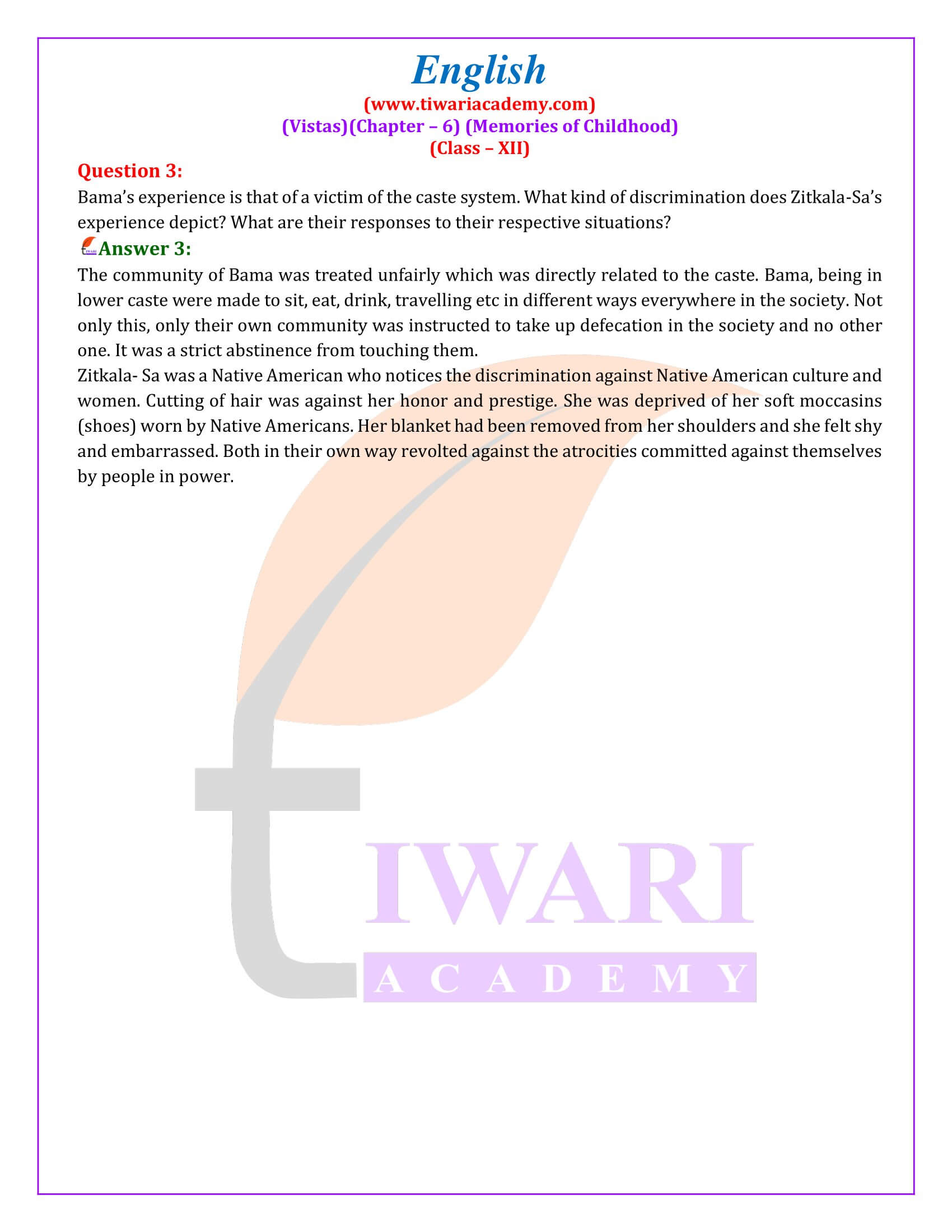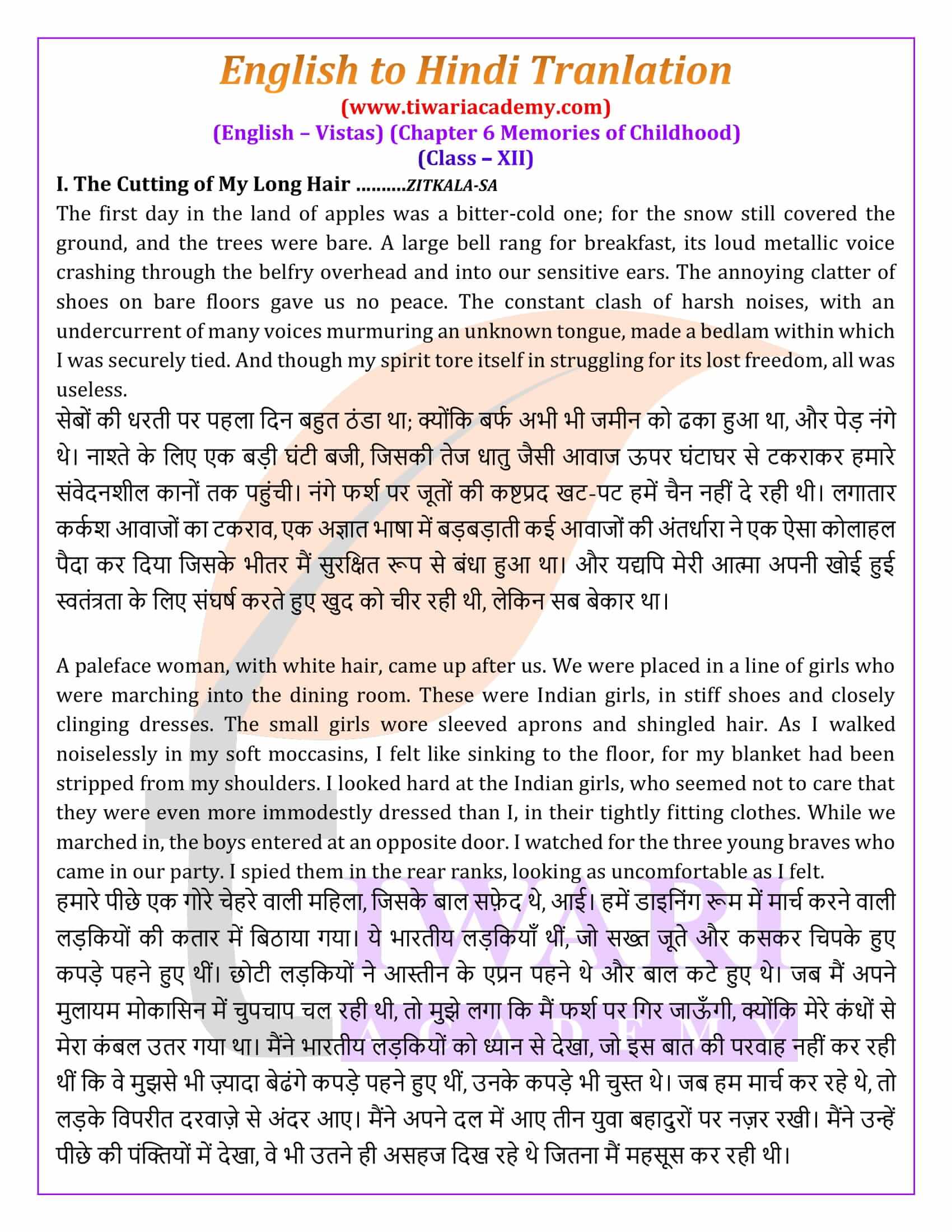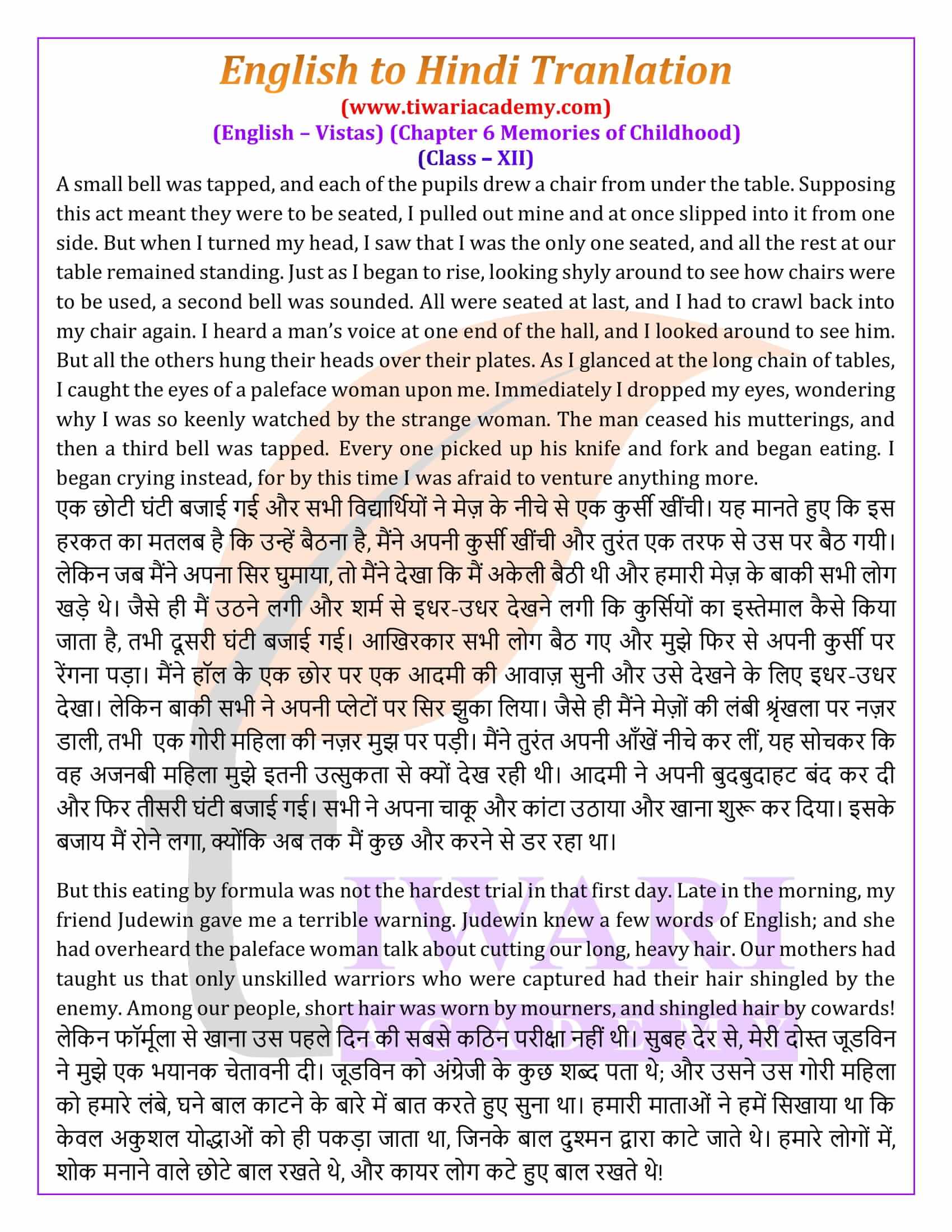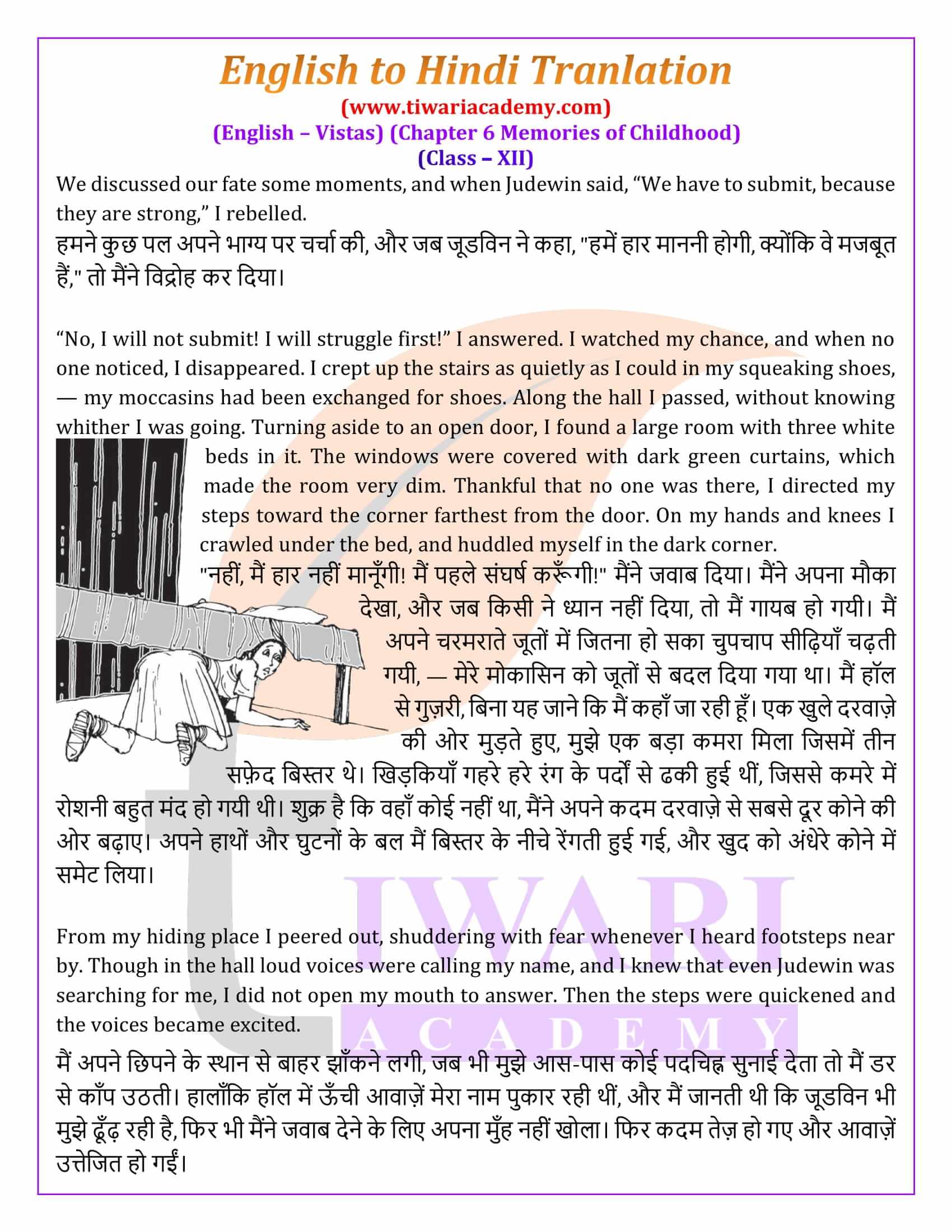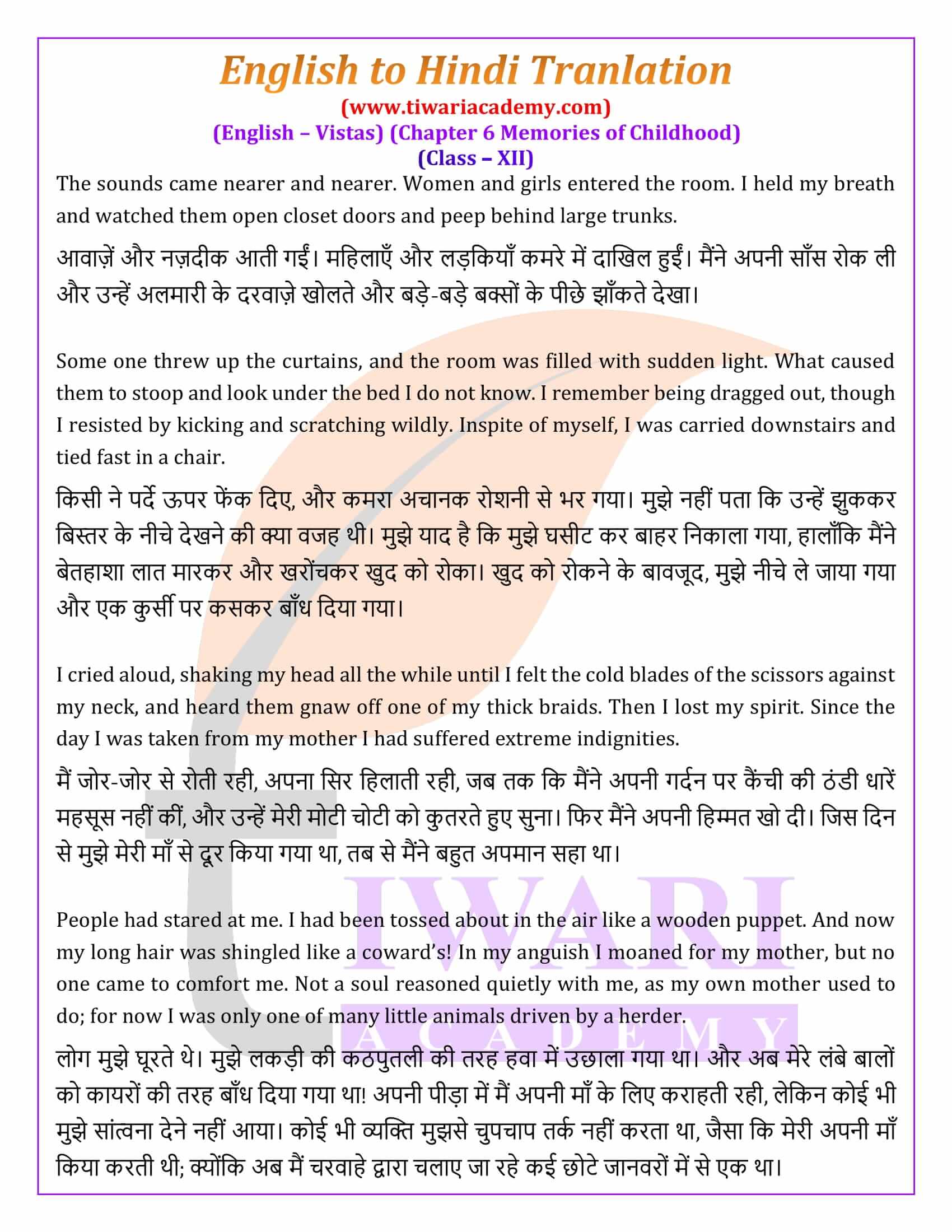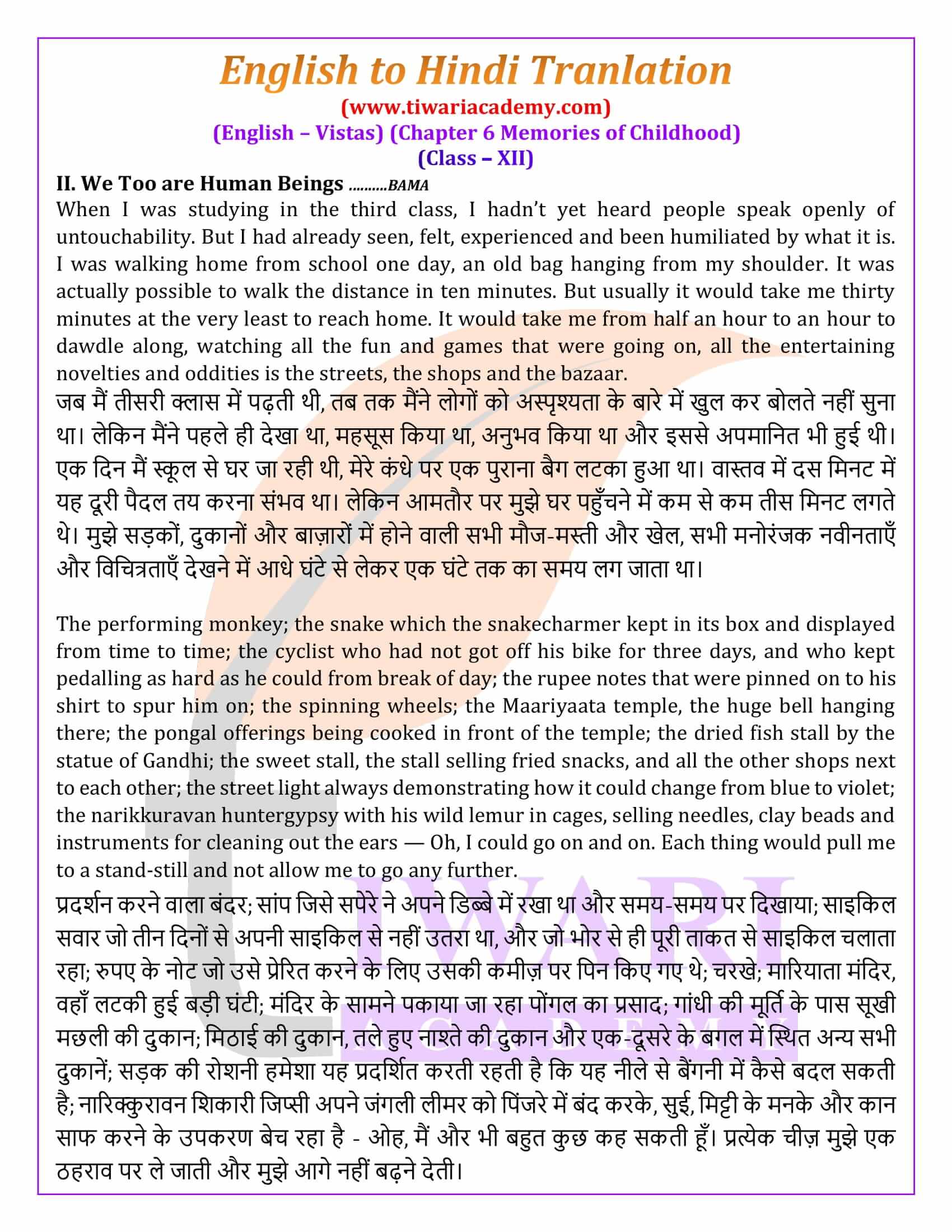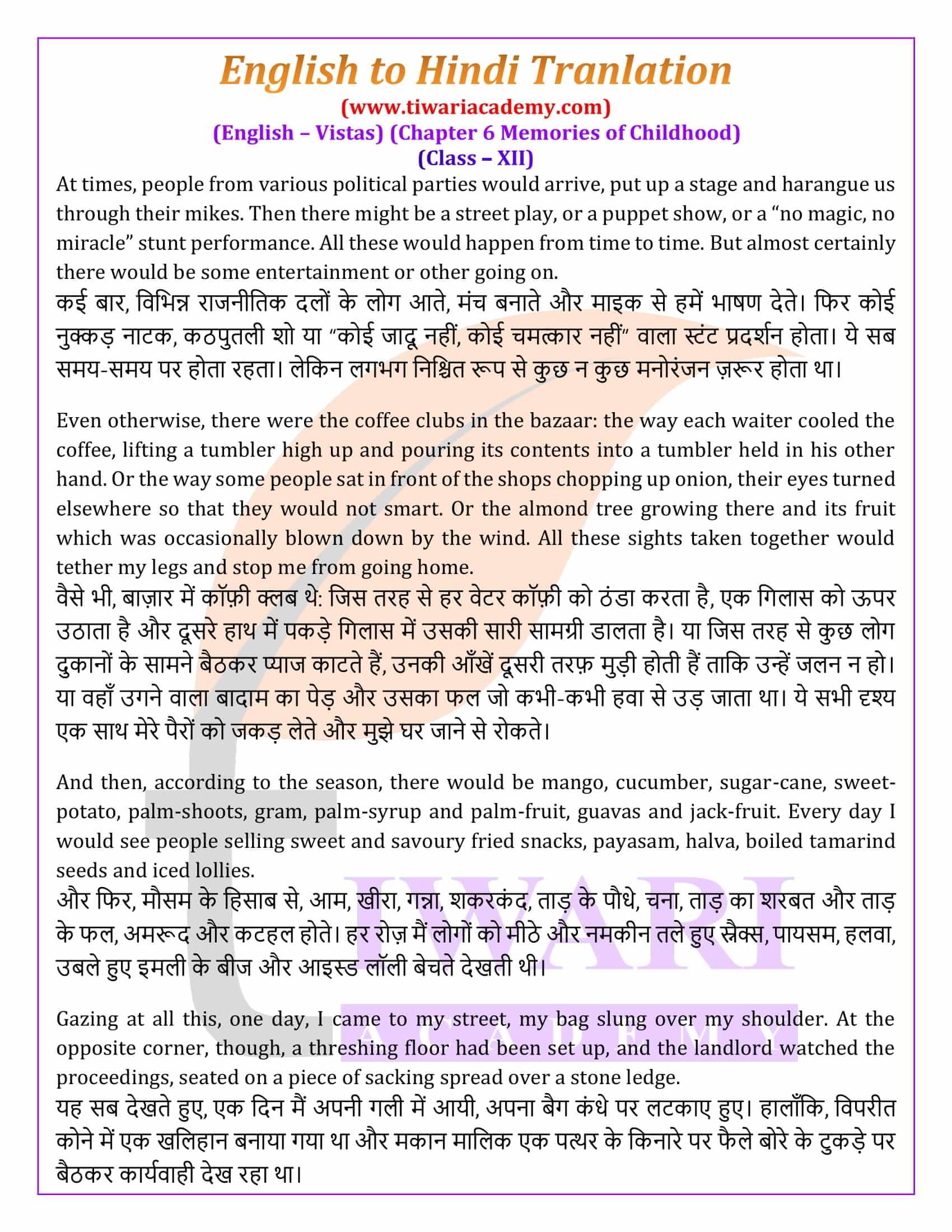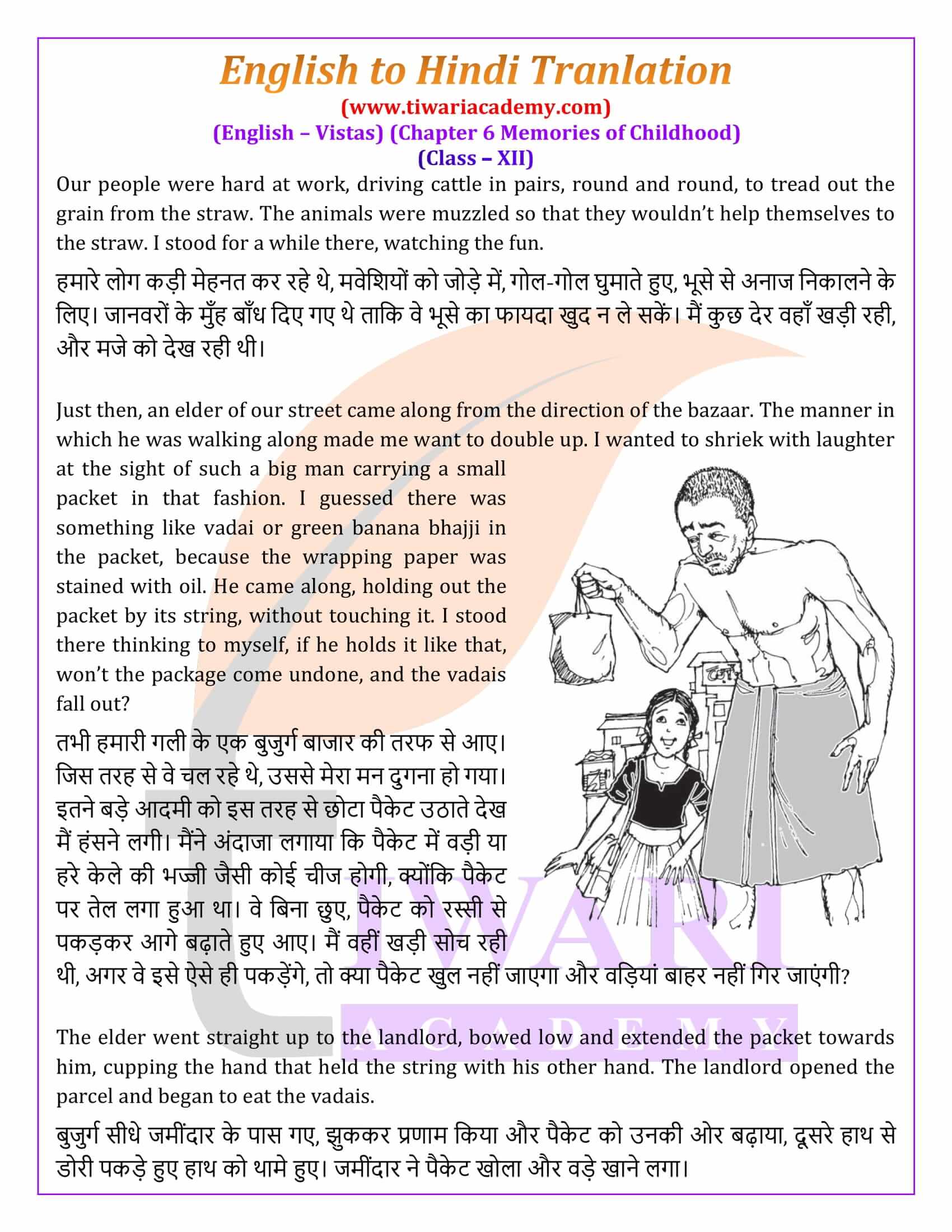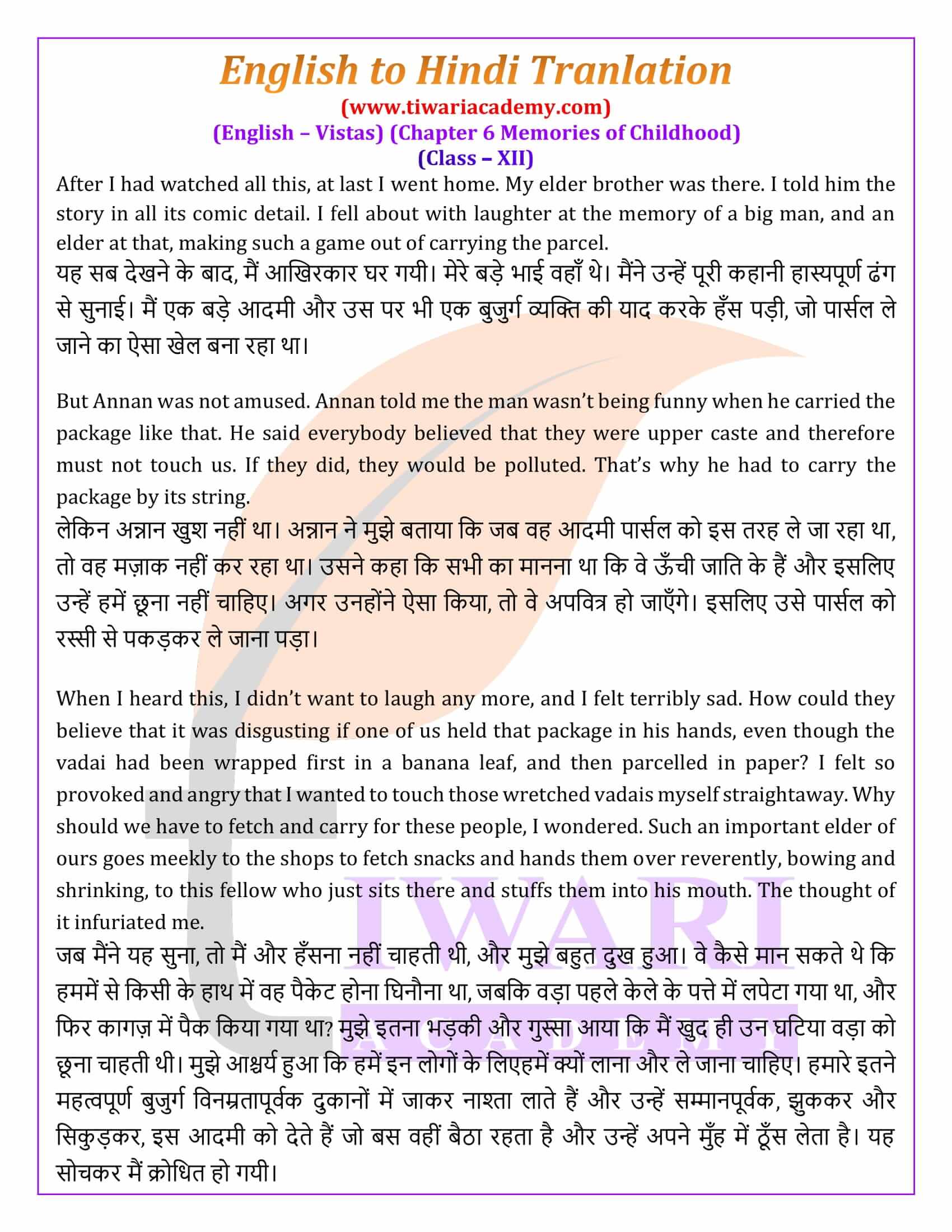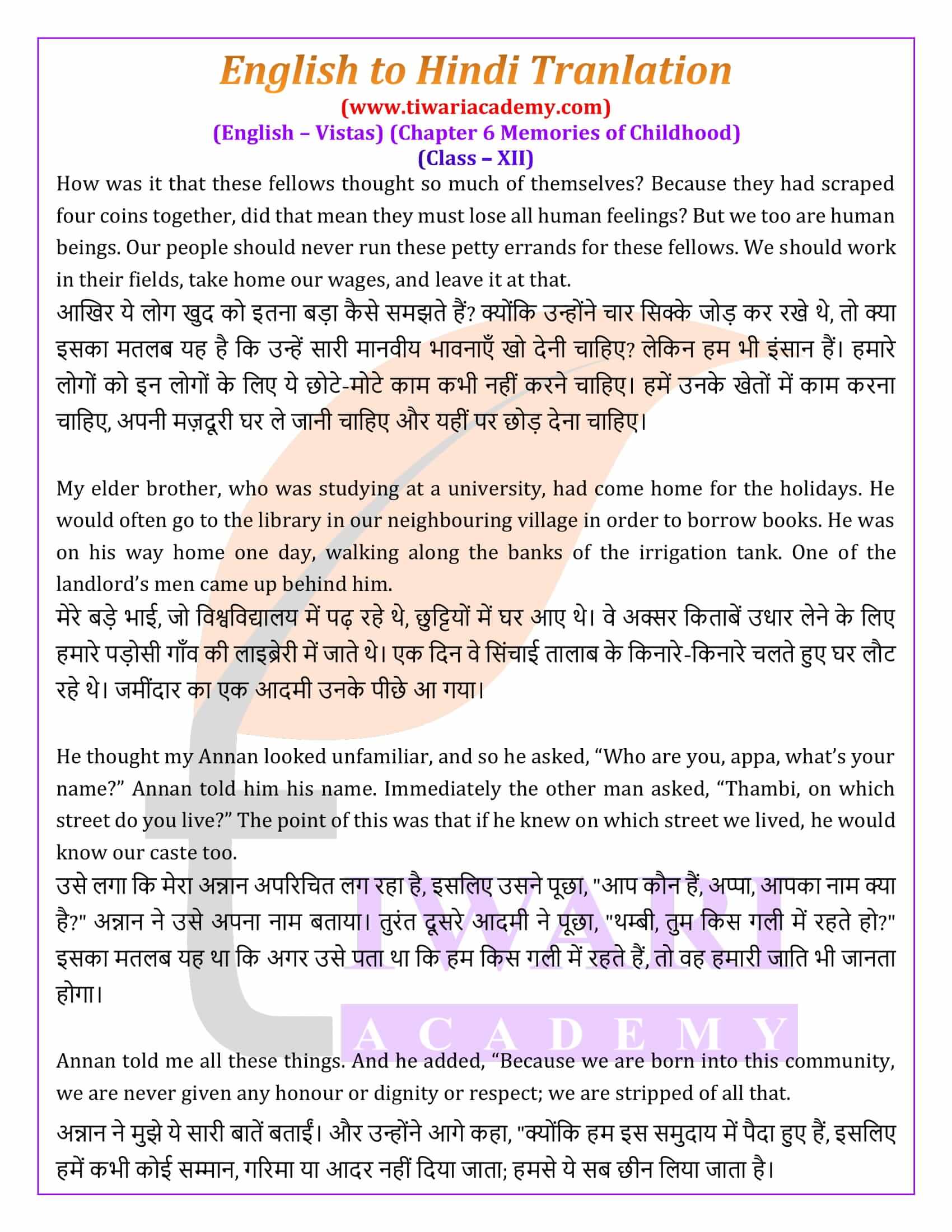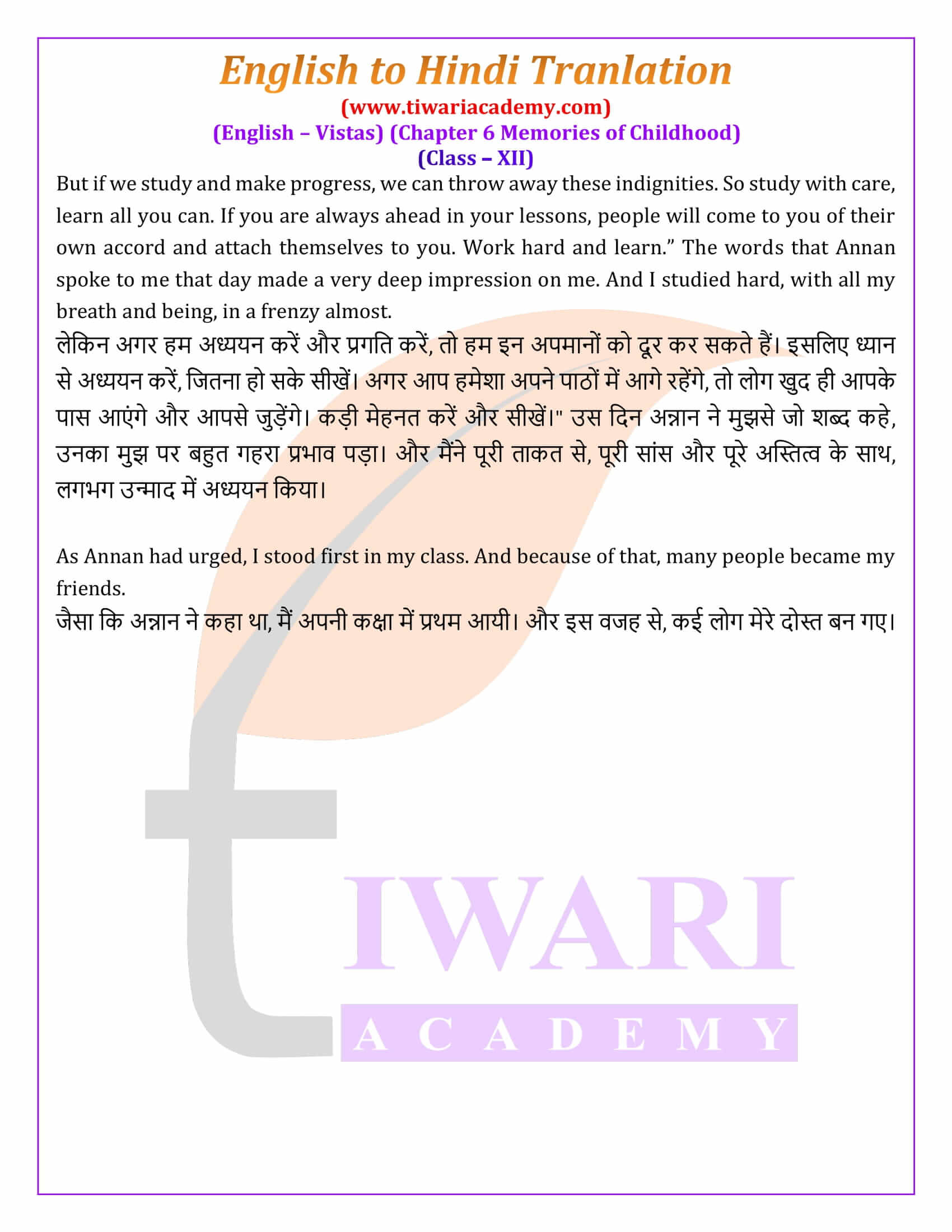NCERT Solutions for Class 12 English Vistas Chapter 6 Memories of Childhood with Hindi Translation updated for new academic session 2025-26. Student can get here answers of 12th English Vistas Chapter 6 question answers, English to Hindi Translation with extra short and long answer type question answers.
Class 12 English Vistas Chapter 6 Question Answers
Reading with Insight (Page No. 100)
The two accounts that you have read above are based in two distant cultures. What is the commonality of theme found in both of them?
These are two stories based on two true events of two distant cultures of two people. But there is discrimination with both. One faces the racial discrimination and other faces caste discrimination. Zitkala-Sa faced racial discrimination because Europeans which used to do a lot with Native Americans. She described the deep misery of having her heritage stripped away when she was forced to pray like others and to cut her traditionally long hair. The horrific experience of her boarding school has shocked all readers.
The second tale depicts the struggles and humiliations faced by young Indian dalit woman. Since she used to belong to a low caste, she was considered as untouchable. Talking with her is a far cry, taking water from her hand and even sitting together was avoided. She felt very bad that she was not considered normal just because her caste was different.
This discrimination was normal until mid 20th century in many countries but after that many movements were launched against it and now it has been controlled. But it has been very painful for those who have faced these problems then. Hence, the discrimination was done with both in different manners.
It may take a long time for oppression to be resisted, but the seeds of rebellion are sowed early in life. Do you agree that injustice in any form cannot escape being noticed even by children?
Oppression to any kind of injustice takes a decent time but the seeds are sown in early life only. Children see and understand things very closely and carefully. Seeing injustice being done, adults often ignore or suppress or forgive but children’s brain is in the growing age at that time, due to which good or bad memories are stored in their mind forever. And after growing up, either they want to change that by leading or they want to take revenge.
Similar was the case with Zitkala Sa who was filled with anger and fire. She did not surrender when her friend Judewin told her that Zitkala’s long hairs will be cut. She declares that she will not submit. She will struggle first. She resists by kicking and scratching wildly when she is pulled out from under the bed to cut her hair. Her spark against oppression was not easily extinguished. Every person has his own way of expressing the wrongful behavior or discrimination done to him and Zitkala Sa and Bama expressed theirs through respective autobiographies. Bama, in her childhood had the anger for higher communities because they were treated differently. This distinction of upper class with lower class was a common thing in that era. She was ready to rebel against the oppression by snatching the packet of vadai from the landlord and eating them herself and she would have done it that day if her brother had not stopped her.
Bama’s experience is that of a victim of the caste system. What kind of discrimination does Zitkala-Sa’s experience depict? What are their responses to their respective situations?
The community of Bama was treated unfairly which was directly related to the caste. Bama, being in lower caste were made to sit, eat, drink, travelling etc in different ways everywhere in the society. Not only this, only their own community was instructed to take up defecation in the society and no other one. It was a strict abstinence from touching them. Zitkala- Sa was a Native American who notices the discrimination against Native American culture and women. Cutting of hair was against her honor and prestige. She was deprived of her soft moccasins (shoes) worn by Native Americans. Her blanket had been removed from her shoulders and she felt shy and embarrassed. Both in their own way revolted against the atrocities committed against themselves by people in power.
How was Zitkala-Sa’s first day in the land of apples?
The first day of Zitkala-Sa was very bad and never forgotten day of her life. We can call it as black day of her life. When the first bell rang, she could not understand its signal. Something similar happened on the second bell which meant everyone had to sit down. Nor she understands the voice of a man whose screaming voice was directed by a command. Zitkala Sa started crying when everybody started eating because she was embarrassed and terrified of all the changes suddenly occurred to her. Hair cutting was strictly forbidden in her religion, but she was forced to cut her hair, which she strongly opposes. On the very first day, many unpleasant incidents happened to her from which we can say that she had a bad start in the school.
What did Judewin tell Zitkala-Sa?
It was Zitkala-Sa’s first day of school and in the evening her friend Judewin, who understood little English, tells her that she has heard a woman she will cut off any student’s long hair. It gives Zitkala-Sa a very intimidating shock but she refuses to surrender and says that she will not bow down to it. She was told at home by her mother since childhood that short hair was worn by mourners and shingled hair by cowards. Judewin was ready to bow down to her European teachers, but Zitkala-Sa refused.
Hair cut is common among girls. Why it was not the case with Zitkala-Sa?
Zitkala-Sa came from a family where hair cut was not considered good. In particular, there was a decree for women to have long hair. She said to her friend Judewin that her mother has taught her only unskilled warriors who were captured by enemy have their hair shingled. She strongly felt that short hair was worn by mourners and shingled hair by cowards. Even though fashion and trends have been at their peak in most of the countries of the world and true discipline has been instructed to keep short hair, but ZitkalaSa did not want to break her principles and ideals.
What words of Bama’s elder brother touched her heart?
Bama’s elder brother was mature and understood well such evils going on in the society. Bama’s brother explains to her how the people of their community are discriminated against after an elderly man holds the packet in a strange way. Her brother explains to her that this process has been going on for years and the way out of it is to get good education. If they study well and get top marks in the examination, then they will get respect in the society and they will get equal rights. These things touched Bama’s heart and she started working hard for good marks from that day.
Why did Bama take one hour on the way home from school instead of 10 minutes?
Bama was in third class and a little playful & mischievous girl of that age. When she used to walk home from school, the distance was only 10 minutes but she used to pass by staring at all the entertaining novelties and oddities of the market. She used to watch the game of monkey and snake with great attention and interest or at times the fried items being made at sweet shops. Live shows or Puppet shows going on the street used to pull her towards herself and she used to forget that she had to go home too. Selling of fruits and vegetables and adults working on various shops or running bullock carts amazed her always. This way Bama wastes her time while going back home from school in afternoon.
Why was it funny for Bama to have an older man take the packet by string and give it to someone?
It was funny for Bama to see an elderly man taking food stuff for a powerful category community person. This is because the way he was handling the packet with its string and not touching the base though it was quite heavy and oily despite the fear of falling. After that the old man bows his head and hands over the food parcel. It was all a bit strange for Bama because she had never heard of untouchability until then.
What was Bama’s reaction to hearing about untouchability?
Bama was stunned. She can’t believe her ears that her community is considered so low. The vadai was first packed in a banana leaf and then in a paper bag. Even after that, the people of the “dalit community” bow their heads to the powerful people and still they do not get respect in return. She gets angry at these evils of the society. She strongly feels that they too are human beings and they must get due respect and honor in civil society.
Could Bama follow what her elder brother had told her?
Bama was very surprised to hear about her community that such discrimination is done with them. Her brother has only one solution to get him out of this serious problem and that is higher education. She follows her brother’s word seriously and worked very hard. His brother told him that if we are educated then only people will respect us and we will never be despised in the society.
Tell us something about Zitkala-Sa and Bama’s struggle.
Both Zitkala-Sa and Bama’s struggle was in their own way. Zitkala-Sa knew that the authorities were cutting her hair, she decided to struggle. She hid herself under a bed in a dim room covered with curtains. Soon, she heard voices from hall calling her name. She understood that she was being sought. In no time Zitkala-Sa was dragged out and tied to a chair in a big room where her hair was to cut. But before that happened, she screamed a lot, tried to free her and did everything possible so that they would not cut her hair. She even told Judewin earlier that she would not submit so easily. It turns out that she was mentally strong and did not surrender easily.
Bama had no way of getting angry because they were buried under a powerful community. She suffered a lot because she belongs to a lower caste. She took care of herself and, following her brother’s words, received a good education and later became a teacher.
She rose to fame with her autobiographical novel ‘Karukku’ which chronicles the joys and sorrows experienced by dalit families. She works for the upliftment and awareness of the society through her writing. She once said “We who are asleep must open our eyes and look about us. We must not accept the injustice of our enslavement by telling ourselves it is our fate, as if we have no true feelings; we must dare to stand up for change. We must crush all these institutions that use caste to bully us into submission, and demonstrate that among human beings there are none who are high or low”

